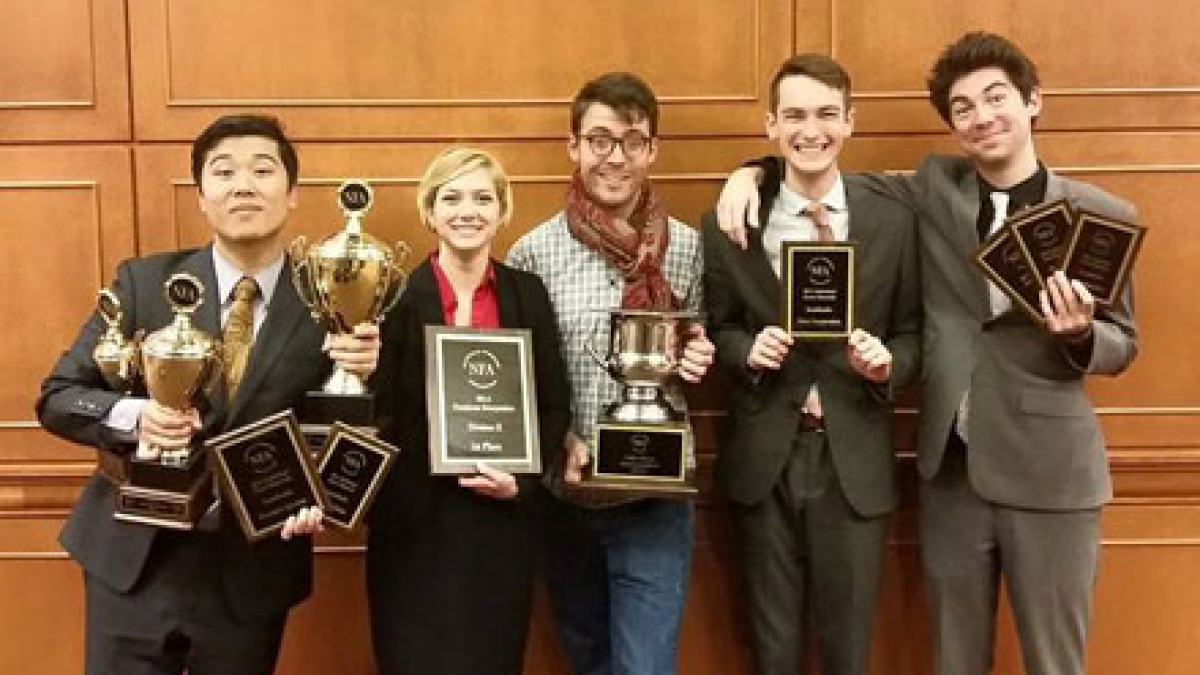Speech and debate classes teach crucial skills for students in an age of activism

The ASU Forensics Team.
Student speech is having a moment on the national stage.
Since the tragic shooting at Marjory Stoneman Douglas High School on Feb. 14, student survivors have emerged as powerful voices, earning accolades for their composure and well-articulated arguments.
Some say what we are hearing from the students of Parkland, Florida, and their contemporaries across the country is what happens when classroom passion and parlance get real-world practice.
“Speech and debate, also known as forensics, sharpen students’ ability to think and listen critically, and articulate their thoughts confidently and persuasively,” said Adam Symonds, director of the Arizona State University Forensics Team. “Many high schools across the country have taken on the issue of gun control in their speech and debate classes. These teams research state laws, brainstorm arguments for and against universal background checks, and write speeches.”
Symonds says speech and debate prepare students to think on their feet and respond quickly to opposing viewpoints. He notes that participation in speech and debate tournaments requires students figure out how to advocate for something they believe. Through the process of research, they learn what their opponents are saying about a topic and think about counter-arguments.
As an undergraduate student at ASU, Jodi Preudhomme, now Title IX coordinator and special counsel at the university, was a member of the Forensics Team for three years. She credits her experience on the team for honing her skills in the art of debate.
“Speech and debate is an excellent way of improving speaking skills and is particularly helpful in providing experience in developing a convincing argument,” said Preudhomme. “When you are in debate rounds, you are sometimes forced to argue against your natural point of view, and you realize that arguments, like coins, always have at least two sides. Debating builds confidence in your ability to engage with individuals on all sides of a topic regardless of what your personal opinion is on the topic.”
Linda Lederman, director and professor at the Hugh Downs School of Human Communication, at ASU agrees.
“All students can benefit from participating in speech and debate,” said Lederman. “In fact, employers look specifically for the skills taught, such as critical thinking, communication, collaboration and creativity.”
Hugh Downs School doctoral students currently coach local high school speech and debate students, not unlike the Parkland students.
“I help students deconstruct their text and critically analyze their meanings and then assist in the process of the physical performance,” said Tyler Rife, a graduate teaching associate who coaches at Phoenix Country Day School in Paradise Valley. “I make sure the work is logical and coherent, as well as emotionally impactful. We want to showcase confidence in their performance and argument.’”
Michael Tristano, also a graduate teaching associate and coach, has been involved with speech and debate for more than 13 years.
“My role as a coach is never focused on trophies,” he said. “I teach students that the greatest accolade they can receive in this activity is having someone listen to their story and their truth.”
Tristano says all of the skills students need to become change-makers — including argumentation development, political awareness, style, confidence, hope, determination, advocacy and a hard work ethic — are learned through speech and debate.
Each January, more than 1,600 high school students from around the country compete in ASU's Hugh Downs School of Human Communication Invitational Speech and Debate Tournament in Tempe, the largest tournament in Arizona. Representing more than 125 schools in 19 states, the students are members of the National Speech & Debate Association, formerly the National Forensic League.
For more information about speech and debate at ASU log on to https://humancommunication.clas.asu.edu/student-life/forensics
More University news

ASU earns 'Gold' in inaugural Times Higher Education Online Learning Ranking
Arizona State University continues to set the standard in online learning, having earned a Gold rating in the inaugural Times…
2024 President's Awards honor ASU projects for real-world impact
Ten Arizona State University programs were honored for their real-world solutions during the annual President’s Awards ceremony…

ASU celebrates Paul C. Helmick Center renaming
When Mary Jo Helmick cut the ribbon at the front doors of the Paul C. Helmick Center at Arizona State University, more than 100…